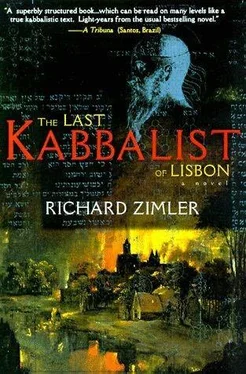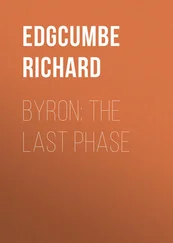Richard Zimler - The Last Kabbalist of Lisbon
Здесь есть возможность читать онлайн «Richard Zimler - The Last Kabbalist of Lisbon» весь текст электронной книги совершенно бесплатно (целиком полную версию без сокращений). В некоторых случаях можно слушать аудио, скачать через торрент в формате fb2 и присутствует краткое содержание. Год выпуска: 1998, Издательство: Arcadia Books, Жанр: roman, Исторический детектив, Философия, на английском языке. Описание произведения, (предисловие) а так же отзывы посетителей доступны на портале библиотеки ЛибКат.
- Название:The Last Kabbalist of Lisbon
- Автор:
- Издательство:Arcadia Books
- Жанр:
- Год:1998
- ISBN:нет данных
- Рейтинг книги:5 / 5. Голосов: 1
-
Избранное:Добавить в избранное
- Отзывы:
-
Ваша оценка:
- 100
- 1
- 2
- 3
- 4
- 5
The Last Kabbalist of Lisbon: краткое содержание, описание и аннотация
Предлагаем к чтению аннотацию, описание, краткое содержание или предисловие (зависит от того, что написал сам автор книги «The Last Kabbalist of Lisbon»). Если вы не нашли необходимую информацию о книге — напишите в комментариях, мы постараемся отыскать её.
The Last Kabbalist of Lisbon — читать онлайн бесплатно полную книгу (весь текст) целиком
Ниже представлен текст книги, разбитый по страницам. Система сохранения места последней прочитанной страницы, позволяет с удобством читать онлайн бесплатно книгу «The Last Kabbalist of Lisbon», без необходимости каждый раз заново искать на чём Вы остановились. Поставьте закладку, и сможете в любой момент перейти на страницу, на которой закончили чтение.
Интервал:
Закладка:
Diego was a family friend whom Uncle was initiating into his threshing circle, his group of mystics which met in secret to discuss kabbalah. Although a robust man with the graying beard and commanding brown eyes of a patriarch, he’d had his heart reduced to ash in the Inquisitional flames of Seville which had claimed his wife and daughter four years earlier and from which he’d barely managed to escape. Often, Uncle and I sought ways to renew his spirit, and we had convinced him to go for a walk today through Sintra forest so that we might sketch the great white cranes before their migration north.
“Perhaps Senhora Belmira’s family has kept him behind,” I said. A neighbor and friend of Diego’s, she’d been beaten to death in Xabregas, one of the city’s eastern districts, two months before. Diego had been spending a lot of time with her loved ones of late.
Uncle shrugged and cupped his hands around my nose. “Refresh yourself,” he said, and as I sniffed at his myrtle-scented fingers, he added, “If he isn’t here soon, we’ll go to his place and check. Oh, and when we do go out, I’ll need to pass by New Merchants Street. I promised Esther I’d deliver the Book of Psalms she’s just finished.”
My master had a way of turning business transactions into disputations on the sex lives of angels and other esoteric matters. “You have precisely the time it takes Diego and me to down a cup of wine at the Attic Inn!” It was a tumbledown garret, but it served kosher wine on the sly.
His lips sculpted a dismayed but amused frown. “Look who’s giving orders!” he observed.
I met his challenge with the bored expression I used to practice to irritate my father when he spoke of Talmud classes. He nodded his agreement. “All right, no more than a half hour.” He motioned for me to bend so he could bless his hand over me. Then, as I picked dyes and colors from the storage cabinet, he unlocked the genizah , the traditional hiding place for old books in a synagogue. Ours was a pit—three feet wide by four feet long—sunken into the floor at the western perimeter of the prayer mat. Its contents were constantly changing; books smuggled out of Portugal were soon replaced with others my master discovered and either bought or begged.
Uncle stepped one foot down into the genizah to retrieve our work. By the time he’d climbed back out, I was at my desk, arranging my brushes and dyes. Placing my manuscript neatly on the slightly inclined surface of the desk in front of me, he circled his hand around the back of my neck and advised me with a parable on the coloration for my most recent illumination, one of the tales from the famous collection of “Fox Fables.” As I began to offer an analysis of his words, his lips began to tremble and his hand grew cold against my skin. “What is it, Uncle?” I asked.
He rubbed his eyes with both his hands, like a child, took a long inhale of breath as if to ready himself for a challenge. “You’re so grown up,” he said gently. “Already my equal in so much. And yet in other matters…” He shook his head, smiled wistfully. “There is so much I’d like to tell you… Beri, God may soon demand that we take separate paths.” He reached into his pouch and took out a scroll of vellum. Handing it to me, he said, “Be so kind as to accept this little gift.”
The scroll unfolded into a vellum ribbon on which were scripted both our Hebrew names in elegant golden lettering. “Esther made it for me,” he continued. He gripped the back of my neck and, in an urgent voice, added, “If ever you should need me, wherever you are, no matter how far or how desperate the circumstances, send this ribbon to me and I will come for you.” He placed his other hand atop my head, stared pressingly into my eyes. “And if, for any reason, you find me beyond your earthly reach, pray over it and I will make every effort to appear before you.”
So touched was I by his grace, by my master’s generosity, that my throat parched with a kind of desperate yearning. Tears clouded the room. I had to swallow several times just to whisper, “But we will never be separated. I will always…”
Uncle told me, “Youth is meant to be separated from age for a time. You will go your way as it should be, then return. But no demon, however powerful, shall stand in my way if you are in trouble!” He took his hand from atop my head and caressed my cheek. “Now come, let’s work together.”
“But is there nothing that I can…?”
He held up his hand and pointed to my manuscript. “Woe betide the kabbalah master who answers every question posed by his apprentice! Now get to work!”
A few minutes later, as I was highlighting the powerful legs of a young dog in my illumination with minute strokes of black, a shriek like shattered glass cut the air. “Go!” my master yelled.
I bounded up the stairs. The kitchen was empty. Harsh voices from outside pounded against the walls. I climbed through my bedroom window into the store, dashed out onto Temple Street. As I removed my skullcap, I spotted Aunt Esther kneeling over our friend, Diego the printer. He was moaning. Blood was spilling from a gash on his bearded chin into her hands.
Chapter II
Diego the printer was the first to contribute to the river of blood which would, over the next few days, lead us into a desert landscape bordered everywhere by grief. But at the time, this geography of death was still a secret from us.
Streams of sweat stained his temples and cheeks with a residue of the city’s endless dust. Blood sluiced over his neck from the gash at his chin. Coughing, he fought for breath. “I was walking here…just walking,” he said in Portuguese. “By the river, I stopped by the Kings Well to wash my hands.” Aunt Esther unbuttoned the top of his crusted doublet, cleaned his chest with fabric rent from her blouse. I noticed the brown line of an old scar on his chest, just under his collar bone, almost as if a worm had burrowed there.
Around us, neighbors were beginning to gather now, to whisper together. “Two boys…” Diego continued, “…they yelled that I was poisoning the well with an essence of plague. They ran after me. I fell. They threw stones. ‘Get the long-tailed rabbi! Get the long…’ A swarthy man in a blue cape saved me. Tall, strong…”
In Diego’s desperation, his last words sought the comfort of Hebrew. “Speak Portuguese,” I whispered to him as we laid him back onto the cobbles.
Diego’s turban slipped off, and I saw for the first time the wisps of thinning gray hair over his ears, the brown birthmarks dotting his scalp. A folded paper dropped free as well. Believing it might contain a personal message or a prayer formula which would incriminate him as a practicing Jew, I snatched it up, hid it in the large drawstring pouch I keep around my neck and which functions as a kind of knapsack. Judah brushed against me, icy with fear, and I had to shake him to get him to run to Dr. Montesinhos. Uncle had joined us, and, after a rushed prayer, said, “I’m going inside to see what medication I can find.”
I tried to hold Diego’s gash closed by pressing my finger into Esthers makeshift bandage, but soon the linen was soaked crimson. Esther ran off for clean water as I substituted cloth ripped from my shirt. Uncle arrived with Farid. They carried extracts of comfrey and bayberry and geranium, sizings and bole, gum arabic and sulfur water. But none of the styptics could effect a clotting. “It’s his accursed beard!” Uncle grumbled. “I can’t get to the wound.” He told Diego, “Dr. Montesinhos is going to have to shave you.”
Diego, who was from the Jewish priestly caste of Levi, pushed us away when he heard that. “I won’t allow it!” he shouted in Hebrew. “I must have my beard. It is forbidden to…”
Читать дальшеИнтервал:
Закладка:
Похожие книги на «The Last Kabbalist of Lisbon»
Представляем Вашему вниманию похожие книги на «The Last Kabbalist of Lisbon» списком для выбора. Мы отобрали схожую по названию и смыслу литературу в надежде предоставить читателям больше вариантов отыскать новые, интересные, ещё непрочитанные произведения.
Обсуждение, отзывы о книге «The Last Kabbalist of Lisbon» и просто собственные мнения читателей. Оставьте ваши комментарии, напишите, что Вы думаете о произведении, его смысле или главных героях. Укажите что конкретно понравилось, а что нет, и почему Вы так считаете.












